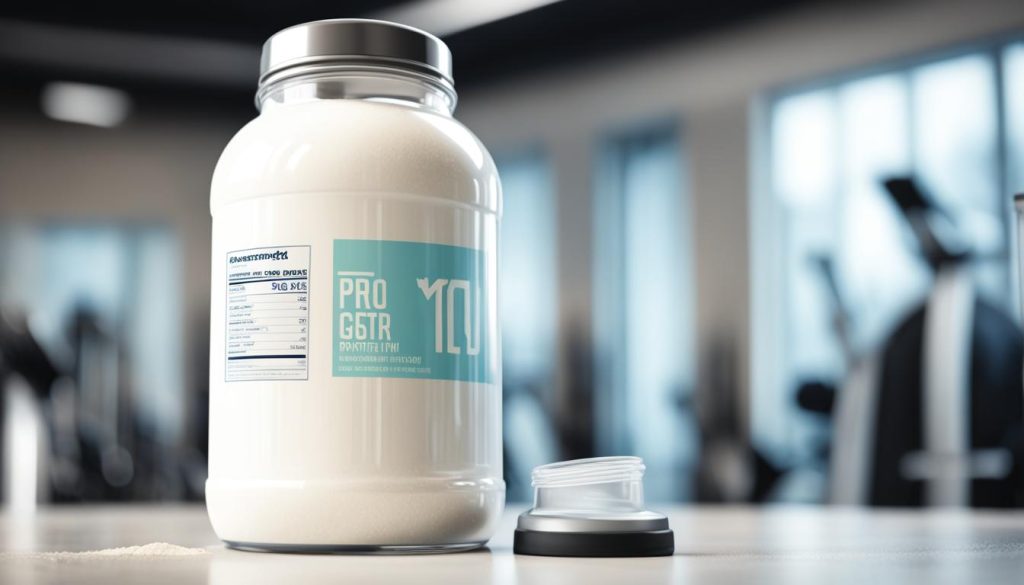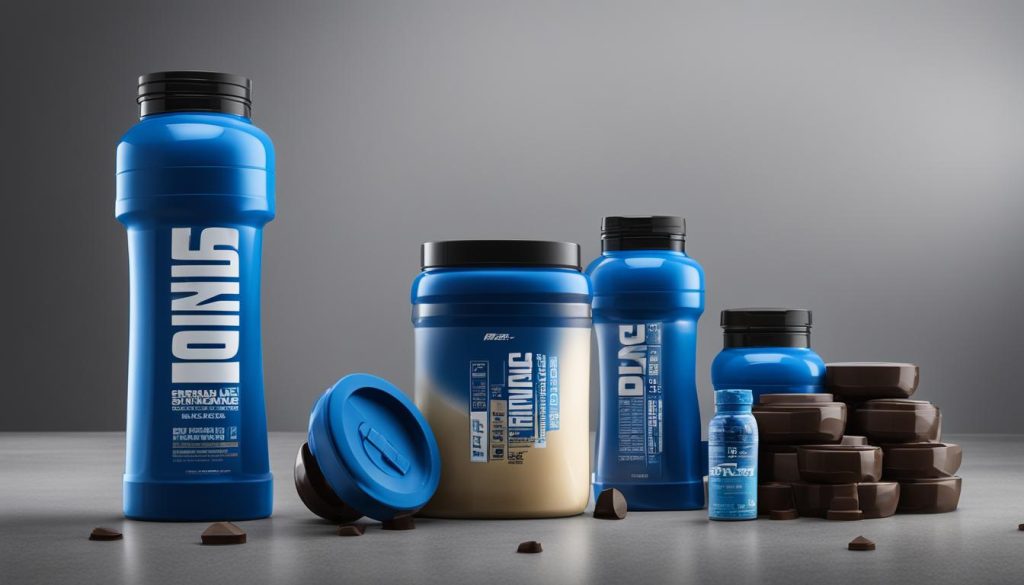Ad Blocker Detected
Our website is made possible by displaying online advertisements to our visitors. Please consider supporting us by disabling your ad blocker.
If you’re looking to build muscle and increase your strength, adding muscle building supplements to your routine can be a game-changer. While supplements alone won’t give you the physique of a bodybuilder, they can support muscle growth when combined with a well-rounded diet and regular resistance training.
There are several muscle building supplements that have shown potential benefits for muscle gain. These supplements work by providing your body with the necessary nutrients to optimize muscle growth and enhance your performance in the gym.
In this article, we will explore the best muscle building supplements that can help you achieve your strength goals. From creatine to protein supplements, we’ll delve into the science behind these products and how they can contribute to muscle growth.
Key Takeaways:
- Supplements can be beneficial for supporting muscle growth when paired with a proper diet and resistance training.
- Creatine is a popular supplement that enhances muscle strength and size.
- Protein supplements provide additional protein for muscle growth, especially for individuals who struggle to consume enough from food alone.
- Weight gainers are high-calorie supplements designed to help individuals increase their overall calorie intake for muscle mass gains.
- Other supplements, such as beta-alanine and branched-chain amino acids (BCAAs), show potential benefits for muscle growth but require further research.
The Benefits of Creatine for Muscle Gain
Creatine is a molecule naturally produced in the body that offers numerous benefits for muscle gain. By increasing the muscle creatine content by up to 40%, creatine provides a significant advantage when it comes to building strength and muscle mass over time. But that’s not all it does.
One of the remarkable effects of creatine is its ability to increase water content in muscle cells. This leads to improved muscle hydration, nutrient delivery, and overall muscle performance.
Additionally, creatine plays a vital role in promoting muscle growth signals and increasing hormone levels involved in muscle development. With higher levels of these growth-promoting hormones, such as insulin-like growth factor 1 (IGF-1), the potential for muscle gains amplifies.
Creatine also plays a crucial role in preventing muscle protein breakdown. By preserving proteins within muscle cells, creatine supports better muscle preservation and recovery, allowing you to train harder and experience less muscle damage.
“Creatine is a valuable tool for athletes and fitness enthusiasts looking to maximize their muscle-building potential.”
So whether you’re a bodybuilder, weightlifter, or an individual looking to increase your muscle mass, incorporating creatine into your supplement regimen can significantly enhance your results.

The Importance of Protein Supplements for Muscle Gain
To achieve optimal muscle gain, it is crucial to ensure that you are getting enough protein in your diet. While protein-rich foods are essential, protein supplements can provide an additional boost, especially for those struggling to meet their protein needs through food alone.
The market offers a variety of protein supplements, including whey protein, casein protein, and soy protein. These supplements are convenient sources of high-quality protein that can support muscle growth and help you reach your fitness goals.
Protein supplements offer several benefits for muscle gain. Firstly, they can increase muscle size by providing the necessary building blocks for muscle growth and repair. Secondly, protein supplements improve muscle strength, enabling you to reach new levels in your fitness journey.
Furthermore, protein supplements promote muscle protein synthesis, the process in which new muscle proteins are created. This is essential for enhancing muscle mass and maximizing your gains from workouts.
The recommended protein intake for muscle gain is approximately 0.6-0.9 grams per pound of body weight. However, athletes and individuals undergoing intense exercise may benefit from higher protein doses. Protein supplements can help bridge the gap between dietary protein intake and your desired protein goals.
Types of Protein Supplements
When it comes to protein supplements, you have several options to choose from:
- Whey Protein: Derived from milk, whey protein is a highly popular choice among fitness enthusiasts due to its fast absorption rate and complete amino acid profile.
- Casein Protein: Also sourced from milk, casein protein is a slower-digesting protein that provides a sustained release of amino acids, making it ideal for overnight muscle recovery.
- Soy Protein: A plant-based protein option, soy protein is suitable for vegetarians and vegans. It contains all the essential amino acids and offers similar muscle-building benefits to animal-based proteins.
By incorporating protein supplements into your diet, you can ensure that your body has a steady supply of protein to support muscle growth and recovery.

The Role of Protein Supplements in Muscle Gain
Protein supplements play a vital role in your muscle gain journey. They provide the necessary nutrients to fuel muscle protein synthesis and promote muscle growth.
Protein supplements offer a convenient and effective way to increase your protein intake and support muscle gain.
Whether you’re aiming to build lean muscle mass or enhance your athletic performance, protein supplements can help you achieve your goals. Remember to choose a supplement that aligns with your dietary preferences and goals for optimal results.
The Role of Weight Gainers in Muscle Building
If you find it challenging to consume enough food to support your muscle-building goals, weight gainers can be a useful addition to your regimen. These high-calorie supplements are specifically designed to provide additional calories and protein to fuel muscle growth. They typically contain a combination of carbohydrates, protein, and fats, offering a convenient and efficient way to increase your calorie intake.

Weight gainers can be particularly beneficial for individuals who struggle with a high calorie intake from food alone. By supplementing with weight gainers, you can ensure that your body has the necessary fuel to support muscle growth and recovery. These supplements offer a convenient way to meet your caloric needs, especially if you have a fast metabolism or a busy schedule that makes it difficult to consume enough food.
Here is an example of a weight gainer supplement:
| Product | Calories | Protein | Carbs |
|---|---|---|---|
| Weight Gainer XYZ | 600 | 30g | 80g |
Weight gainers can provide a significant calorie boost, allowing you to meet your elevated calorie requirements for muscle building. Additionally, they offer a convenient source of protein, which is essential for muscle growth and repair.
However, it’s important to note that weight gainers should not replace your regular meals entirely. These supplements are intended to complement a balanced diet and should be consumed as part of an overall nutrition plan. It’s essential to ensure that you’re also getting a wide range of nutrients from whole foods to support your overall health and well-being.
To determine the appropriate calorie intake from weight gainers, consult with a healthcare professional or a registered dietitian who can assess your specific needs and goals. They will be able to recommend the right dosage and provide guidance on incorporating weight gainers into your overall food intake.
Remember, the key to successful muscle building is a combination of proper nutrition, regular resistance training, and adequate recovery. Weight gainers can be a helpful tool in your muscle-building journey, but they should be used in conjunction with a well-rounded approach to optimize your results.
The Potential of Beta-Alanine for Muscle Mass
Beta-alanine is an essential amino acid that holds promising potential for enhancing muscle mass and improving exercise performance. By incorporating beta-alanine into your supplement regimen, you can reap the benefits it offers when combined with resistance training.
One of the key advantages of beta-alanine is its ability to reduce fatigue during intense workouts. When you engage in high-intensity exercises, your muscles produce lactic acid, leading to muscle fatigue and decreased performance. Beta-alanine helps buffer the build-up of lactic acid, allowing you to push through fatigue and train harder.
Improved exercise performance is not the only benefit of beta-alanine. Research suggests that this amino acid may contribute to an increase in lean body mass. Lean body mass refers to the amount of muscle tissue in your body, which contributes to strength, power, and overall physical fitness.
While beta-alanine shows promise, it’s important to note that more research is needed to fully understand its effects on muscle gain. However, adding beta-alanine to your routine as part of a well-rounded supplement stack can complement your resistance training efforts and potentially enhance your muscle-building results.
Remember, consistency is key. Pairing beta-alanine supplementation with a structured resistance training program can optimize your chances of achieving your muscle-building goals.
To illustrate the potential benefits of beta-alanine, consider the following studies:
| Study | Findings |
|---|---|
| Athlete Study | A 8-week study on athletes found that beta-alanine supplementation led to significant improvements in lean body mass compared to a placebo group. |
| Resistance Training Study | In a 12-week study involving individuals engaged in resistance training, beta-alanine supplementation resulted in increased muscle endurance and exercise performance. |
| Systematic Review | A systematic review of multiple studies concluded that beta-alanine supplementation could enhance muscle power and exercise performance, particularly during high-intensity activities. |
These studies provide insight into the potential benefits of beta-alanine for muscle mass and exercise performance. Although more research is necessary, the available evidence demonstrates its role as a valuable supplement for individuals engaged in resistance training.

Summary
Beta-alanine has the potential to reduce fatigue, improve exercise performance, and increase lean body mass when combined with resistance training. While further research is needed, incorporating beta-alanine into your supplement routine can potentially optimize your muscle-building efforts. Remember to consult with a healthcare professional before starting any new supplementation regimen.
Next Up: The Role of Branched-Chain Amino Acids (BCAAs) in Muscle Growth
The Role of Branched-Chain Amino Acids (BCAAs) in Muscle Growth
Branched-chain amino acids (BCAAs) play a crucial role in promoting muscle growth and maintenance. Leucine, isoleucine, and valine, the three essential BCAAs, are key players in protein synthesis and muscle recovery.
BCAAs are abundant in high-quality protein sources such as meat, dairy, and legumes. However, supplementing with BCAAs can be beneficial, especially for individuals who may struggle to meet their protein needs through food alone.
Leucine, in particular, is known for its ability to stimulate muscle protein synthesis. It activates a pathway called mTOR, which is responsible for initiating muscle protein synthesis and promoting muscle growth.
Studies have shown that BCAA supplementation can aid in minimizing muscle loss, especially during periods of calorie restriction or intense training. By providing the body with an additional source of amino acids, BCAAs help preserve muscle mass and prevent muscle breakdown.
While BCAA supplementation may have potential benefits for muscle growth, further research is needed to determine its effectiveness and optimal dosages. It is always recommended to consult with a healthcare professional before starting any supplementation regimen.

Benefits of BCAAs in Muscle Growth:
- Stimulates muscle protein synthesis
- Minimizes muscle loss during calorie restriction or intense training
- Supports muscle recovery and reducing muscle soreness
“BCAAs are an effective supplement to support muscle growth and prevent muscle loss. They provide the essential amino acids necessary for protein synthesis and help preserve muscle mass during challenging periods.”
Exploring Beta-Hydroxy Beta-Methylbutyrate (HMB) for Muscle Mass
When it comes to building muscle mass through weight training, one interesting supplement to consider is Beta-Hydroxy Beta-Methylbutyrate (HMB). HMB is a molecule that is naturally produced during the breakdown of the amino acid leucine.
Supplementing with HMB can have significant benefits for individuals who are new to exercise or those who are increasing the intensity of their workouts. Studies have shown that HMB can improve gains in lean body mass when combined with weight training.
While HMB is primarily known for its role in preserving muscle mass during periods of muscle breakdown, it has also been shown to enhance muscle growth and improve recovery time after intense workouts. This can ultimately lead to better muscle gains over time.
HMB accomplishes these positive effects by reducing muscle protein breakdown and enhancing protein synthesis. By reducing muscle protein breakdown, HMB helps to preserve existing muscle mass, while increased protein synthesis stimulates the growth of new muscle tissue.
The Effectiveness of HMB in Weight Training
While HMB can be an effective supplement for individuals new to weight training or those looking to increase the intensity of their workouts, its effectiveness may be reduced in individuals with more weight training experience.
A study published in the Journal of Applied Physiology found that HMB supplementation resulted in significant increases in muscle mass and strength for individuals who were new to strength training. However, the same study showed that the effects of HMB were not as pronounced in individuals with more weight training experience.
Recommended HMB Dosage
The recommended dosage of HMB for muscle mass enhancement is typically between 3 to 6 grams per day, divided into two or three equal doses. It is important to follow the recommended dosage and consult with a healthcare professional before starting any supplement regimen.
Additional Supplements Claiming to Increase Muscle Mass
Aside from the well-known muscle building supplements mentioned earlier, there are other products that claim to enhance muscle mass. These supplements include conjugated linoleic acid, testosterone boosters, glutamine, and carnitine. While they are marketed as muscle builders, it is important to examine the evidence supporting their efficacy before incorporating them into your regimen.
Conjugated linoleic acid (CLA) is a fatty acid commonly found in dairy and meat products. It has been touted for its potential to reduce body fat and increase muscle mass. However, the scientific evidence regarding the effectiveness of CLA for muscle gain is mixed. Some studies have shown promising results, while others have not demonstrated any significant benefits. Further research is needed to determine the true impact of CLA on muscle mass.
Testosterone boosters claim to increase testosterone levels, a hormone associated with muscle growth. These supplements often contain herbal ingredients, vitamins, and minerals that are believed to enhance testosterone production. While some individuals may experience improved muscle gains with testosterone boosters, the evidence supporting their effectiveness is limited. Additionally, it’s important to note that hormonal supplements should be used with caution and under the guidance of a healthcare professional.
Glutamine is an amino acid that plays a vital role in muscle metabolism. It is naturally present in the body and is also available in supplement form. Glutamine is commonly used by athletes and active individuals to promote muscle recovery and reduce muscle breakdown. However, the evidence supporting its impact on muscle mass is inconclusive. While glutamine may have some benefits for certain populations, more research is needed to establish its role in muscle gain.
Carnitine is a compound that plays a crucial role in energy production and fat metabolism. It is naturally produced in the body and is also found in some foods. Carnitine supplements claim to enhance muscle growth by increasing energy levels and improving fat utilization. However, there is limited scientific evidence to support these claims. Some studies suggest that carnitine supplementation may have potential benefits for certain populations, but more research is needed to validate these findings.
It is essential to approach these supplements with caution and consult a healthcare professional before incorporating them into your routine. While some individuals may experience positive results, the effectiveness of these supplements for increasing muscle mass varies, and more evidence is required to establish their benefits conclusively.
Remember, optimal muscle gain is achieved through a combination of proper nutrition, regular exercise, and a well-rounded training program. Supplements should be viewed as complementary to these foundational factors rather than as standalone solutions for muscle growth.

| Supplement | Evidence Supporting Muscle Mass Growth |
|---|---|
| Conjugated Linoleic Acid (CLA) | Mixed evidence, further research needed |
| Testosterone Boosters | Limited evidence, caution advised |
| Glutamine | Inconclusive evidence, more research needed |
| Carnitine | Limited evidence, more research needed |
The Importance of Nutrition and Exercise for Muscle Gain
Supplements alone cannot provide maximal muscle gains. Nutrition and exercise play essential roles in muscle gain. To build muscle, it is important to consume enough calories and protein and engage in regular resistance training. Supplements can complement a well-rounded diet and exercise program.
When it comes to nutrition, maintaining a calorie surplus is crucial for muscle growth. Consuming more calories than your body burns provides the energy needed to fuel muscle development. Focus on consuming nutrient-dense foods such as lean proteins, whole grains, fruits, and vegetables to support muscle growth and overall health.
Protein intake is particularly important for muscle gain as it provides the building blocks necessary for muscle repair and growth. Aim to consume an adequate amount of protein from sources like lean meats, eggs, dairy products, and plant-based proteins. Supplementing with protein powders can also be beneficial, especially for individuals who struggle to meet their protein needs through whole foods alone.
In addition to nutrition, regular exercise is key to building muscle. Resistance training, which includes exercises like weightlifting and bodyweight exercises, stimulates muscle growth by creating small tears in the muscle fibers. As the body repairs these tears, the muscles become stronger and larger.
Designing a well-rounded exercise program that incorporates both compound exercises (which target multiple muscle groups) and isolation exercises (which target specific muscles) can help you maximize your muscle gains. It’s important to progressively increase the intensity and challenge of your workouts over time to continue stimulating muscle growth.
Remember that consistency is key. To see significant muscle growth, you need to be consistent with your nutrition and exercise habits. Aim to stick to a balanced diet and exercise routine that fits your lifestyle and goals.
“Nutrition and exercise are the foundation of muscle gain. Supplements can provide additional support, but they should not be relied upon as a replacement for a healthy, well-rounded lifestyle.”
By prioritizing proper nutrition, including an adequate calorie and protein intake, and engaging in regular resistance training, you can optimize your muscle gains and work towards achieving your desired physique.
Key Considerations for Muscle Gain
| Aspect | Explanation |
|---|---|
| Calorie Intake | Eat a calorie surplus to provide energy for muscle growth. |
| Protein Intake | Consume enough protein for muscle repair and growth. |
| Resistance Training | Engage in regular weightlifting and resistance exercises. |
| Progressive Overload | Increase the intensity and challenge of your workouts over time. |
| Consistency | Stick to a balanced diet and exercise routine for optimal results. |
Adverse Events Related to Supplements
A study on adverse events related to supplements found a three-fold increase in the risk of severe medical events for supplements in the categories of muscle building, energy, and weight loss compared to vitamins. It is important to be cautious when using these types of supplements.
While supplements can offer potential benefits for muscle building, energy enhancement, and weight loss, it’s crucial to be aware of the possible adverse events that can occur. The same study showed that adverse events associated with these types of supplements can range from minor discomfort to severe outcomes such as hospitalization, disability, and even death.
When seeking supplements in categories like muscle building, energy, and weight loss, it’s vital to approach them with caution and prioritize your health and safety. Before starting any supplementation regimen, consider the following:
- Consult a healthcare professional: It is always recommended to consult with a healthcare professional, such as a doctor or registered dietitian, before taking any supplements.
- Research and select reputable brands: Look for supplements from well-established and trusted brands that prioritize quality and safety.
- Read and follow the instructions carefully: Adhere to the recommended dosage and usage instructions provided by the manufacturer.
- Monitor your body’s response: Pay attention to any adverse reactions or side effects and discontinue use if necessary.
- Keep track of other medications you are taking: Inform your healthcare professional about any other medications or supplements you are using to avoid potential interactions.
“The study confirms the need for consumers to be cautious when using supplements in the categories of muscle building, energy, and weight loss. While these supplements may offer benefits, it’s crucial to prioritize your health and seek guidance from a healthcare professional to minimize the risk of adverse events.”
Always remember that supplements are not a substitute for a balanced diet and regular exercise. Prioritizing a nutritious diet, engaging in regular physical activity, and consulting with healthcare professionals can help you make informed decisions and reduce potential risks when using supplements.
| Category | Adverse Events | Precautions |
|---|---|---|
| Muscle Building | Increase in adverse events compared to vitamins | Consult with healthcare professional, choose reputable brands, monitor response |
| Energy | Increase in adverse events compared to vitamins | Consult with healthcare professional, choose reputable brands, monitor response |
| Weight Loss | Increase in adverse events compared to vitamins | Consult with healthcare professional, choose reputable brands, monitor response |
Conclusion
Optimal muscle gains require a comprehensive approach that integrates nutrition, exercise, and the strategic use of muscle building supplements. While supplements can be supportive in enhancing muscle growth, they should not be viewed as a replacement for a balanced diet and regular physical activity. Remember, supplements are meant to complement your efforts, not substitute them.
Throughout this article, we have explored various muscle building supplements such as protein, creatine, beta-alanine, and BCAAs, which have shown potential benefits for muscle growth. However, it is important to note that individual results may vary, and consulting with a healthcare professional before starting any supplement regimen is always advisable.
To optimize muscle gains, focus on consuming a diet rich in protein and calories, tailored to your specific needs. Engaging in regular resistance training exercises that target different muscle groups will stimulate muscle growth and strength development. Supplements can be used strategically to fill nutritional gaps and support your goals, but they should not replace the foundation of nutrition and exercise.
Remember that supplements are just one piece of the puzzle, and a well-rounded training regimen that includes proper nutrition and exercise is crucial for long-term muscle growth and overall health. Stay consistent, listen to your body, and make informed choices when it comes to selecting and using muscle building supplements.
Embrace the journey of muscle building, and enjoy the progress you make along the way. With the right combination of nutrition, exercise, and supplements, you can achieve your optimal muscle gains and unlock the full potential of your physique.
Conclusion
In conclusion, muscle building supplements can be valuable aids in promoting muscle growth when incorporated into a well-rounded diet and exercise program. Key supplements such as creatine, protein, beta-alanine, and BCAAs have demonstrated potential benefits for enhancing muscle gain. However, it is crucial to prioritize proper nutrition and exercise as the fundamental pillars for achieving optimal muscle growth.
While muscle building supplements can provide additional support, they should not replace the essential role of nutrition and exercise in muscle development. A balanced diet that includes sufficient protein, along with regular resistance training, remains paramount for maximizing muscle growth.
Always consult with a healthcare professional before starting any supplement regimen to ensure it aligns with your unique needs and health considerations. Proper guidance can help you choose the right supplements and determine appropriate dosages for your specific goals.
By combining the right muscle building supplements with a well-structured nutrition and exercise plan, you can optimize your muscle growth potential and work towards achieving your fitness goals.
FAQ
What are the best muscle building supplements?
Some of the top muscle building supplements include creatine, protein supplements, beta-alanine, branched-chain amino acids (BCAAs), and beta-hydroxy beta-methylbutyrate (HMB).
How does creatine help with muscle gain?
Creatine can increase muscle creatine content, improve muscle strength, promote muscle growth signals, increase hormone levels involved in muscle growth, and decrease muscle protein breakdown.
Why are protein supplements important for muscle gain?
Protein supplements provide additional protein for muscle growth, especially for those who struggle to consume enough protein from food alone. They can increase muscle size, improve muscle strength, and promote muscle protein synthesis.
What are weight gainers and how do they help with muscle building?
Weight gainers are high-calorie supplements designed to provide additional calories and protein for those who struggle to consume enough food. They can help increase calorie intake and support muscle mass gains, but they should only be used by individuals who have difficulty consuming enough calories from food alone.
How does beta-alanine contribute to muscle mass?
Beta-alanine is an amino acid that can reduce fatigue and improve exercise performance. It has the potential to increase lean body mass, especially when combined with resistance training.
What is the role of branched-chain amino acids (BCAAs) in muscle growth?
BCAAs are essential for muscle growth and make up a significant portion of muscle proteins. Supplementing with BCAAs may be beneficial for individuals who do not consume enough high-quality protein.
How does beta-hydroxy beta-methylbutyrate (HMB) affect muscle mass?
HMB, produced during the breakdown of the amino acid leucine, can improve gains in lean body mass from weight training, especially for individuals who are new to exercise or increasing the intensity of their workouts.
Are there other supplements that claim to increase muscle mass?
Yes, there are additional supplements such as conjugated linoleic acid, testosterone boosters, glutamine, and carnitine that are claimed to increase muscle mass. However, more research is needed to determine their effectiveness.
How important is nutrition and exercise for muscle gain?
Nutrition and exercise play essential roles in muscle gain. It is important to consume enough calories and protein and engage in regular resistance training to promote muscle growth.
Are there any concerns related to supplements for muscle building?
A study found a higher risk of severe medical events for supplements in the categories of muscle building, energy, and weight loss compared to vitamins. Caution should be exercised when using these types of supplements.
Can Magnesium Supplements Help with Muscle Building and Strength?
Many fitness enthusiasts believe in the benefits of magnesium supplementation for muscle building and strength. It is thought that magnesium can help with protein synthesis and energy production, leading to improved muscle function and overall physical performance. Adding magnesium supplements to your routine may support your fitness goals.
How Can Muscle Building Supplements Contribute to Overall Health and Wellness?
Muscle building supplements can play a significant role in helping individuals embrace wellness and vitality. By providing essential nutrients and support for muscle growth and recovery, these supplements can contribute to overall health and wellness. When combined with a balanced diet and regular exercise, they can help individuals achieve their fitness goals and lead a healthier lifestyle.


